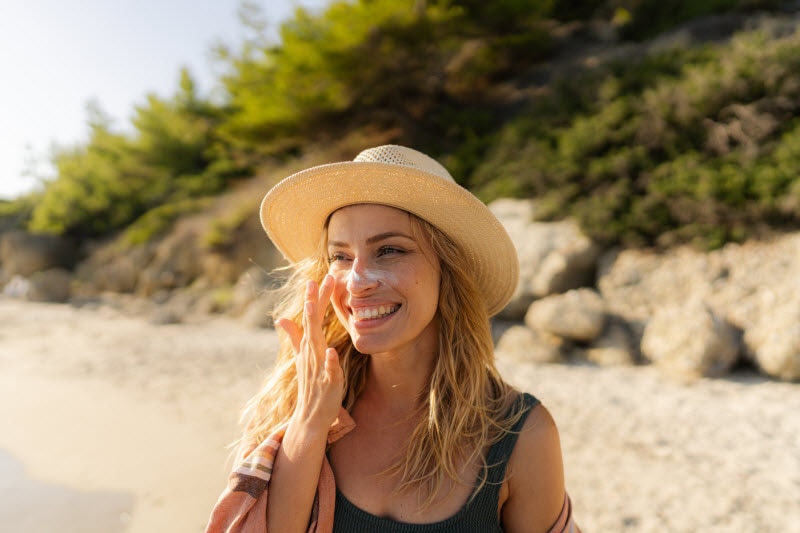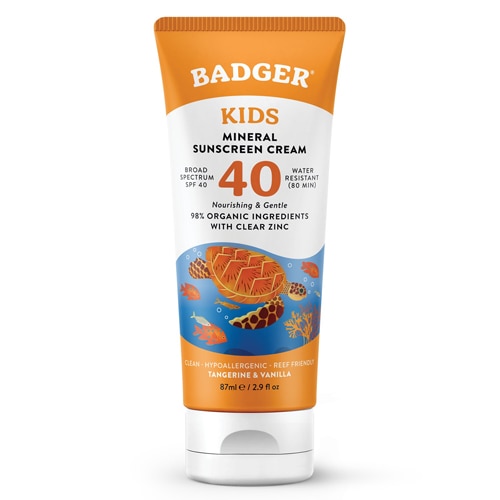[vc_row][vc_column][vc_column_text]I bought my first tube of zinc oxide in my early teens, decades ago. The goo was thick and white, an opaque slick that summer lifeguards spread down and across their noses.
I was not a lifeguard, and I'm not sure how I discovered the sunblock, which was cheap and simple. But I loved how reliably it adhered to my skin and how impenetrable it was. Even after I swam, there the zinc oxide was: a lopsided “O” covering a brown birthmark on my calf, which the insecurity of youth made me want to wipe away.

I couldn't wipe away the birthmark, of course. But with precise application of zinc oxide, I could tan everything around it, which meant the rest of my body, rendering it invisible. I loved zinc oxide for making magic happen.
Zinc oxide is still available today, as foolproof a sunblock as ever. Nowadays, though, as a foil against the sun, it’s more often mixed with other ingredients and of different constitution (nanoparticles). This creates a product without the white opacity of zinc oxide paste but that still packs a physical barrier against damaging ultraviolet rays — and a physical barrier is what you want. (Oh yes, I see the irony of how I used it as a kid.)
When it comes to sun protection,
physical barriers work best. The supreme option:
clothes. When you're clothed, it's harder for UV rays to reach your skin than if you're naked. Just ask your tan lines.
If clothes aren't an option,
mineral sunscreen can deliver a physical barrier instead. Just ask my birthmark. But zinc oxide isn't the only effective mineral for UV defense.
How ultraviolet rays affect your skin
The sun's radiation includes UVA and UVB rays. Both can cause skin cancer. “SPF” stands for “sun protection factor,” but it refers to protection against only UVB rays, which burn skin. UVA rays penetrate deeper, aging your skin and suppressing your immune system. That means you need a sunscreen that fights both types of rays, aka a “broad-spectrum” or “full-spectrum” sunscreen. Mineral sunscreen inherently fits this bill.
How mineral sunscreen works
Mineral sunscreen deflects ultraviolet rays using the physical structure of minerals, namely zinc oxide and titanium dioxide. Of the two, zinc oxide is the most effective at shielding against UVA and UVB rays.
The mineral or both minerals sit on the surface of your skin, though not to the pronounced degree the zinc oxide paste sat on my calf. This sit-and-deflect system means you might sense the sunscreen on your skin, though some brands are thicker than others and feel that way. That said, you're pretty much set to step outside as soon as you put on mineral sunscreen.
Chemical vs. mineral sunscreen
Toxicity
As a matter of course, mineral sunscreen is less toxic for you, and for the environment, than
chemical sunscreen.
Among the active ingredients in sunscreen, the U.S. Food and Drug Administration has recognized only zinc oxide and titanium dioxide to be
generally “safe and effective.” But be sure to rub products with zinc oxide and titanium dioxide onto your skin, not spray them or apply them as powders; both minerals have inhalation risks, especially titanium dioxide, which the International Agency for Research on Cancer classifies as a possible human carcinogen if inhaled.
Unlike the minerals in mineral sunscreen, which, as mentioned, sit on your skin, the chemicals in chemical sunscreen penetrate your skin. That means they make it into your body. As a rule, you don’t want chemicals in your body. They include oxybenzone, octinoxate, octisalate, octocrylene, homosalate and avobenzone.
Oxybenzone is the most troubling of the bunch, according to Environmental Working Group, a Washington, DC–based nonprofit organization that investigates chemicals in self-care products. The chemical can disrupt hormones, among other concerns.
Avobenzone is the least troubling. It's on par with zinc oxide for fighting UVA and UVB rays, and it's the only chemical in chemical-based sunscreen with a
“low-hazard” rating from EWG.
In terms of the environment, common chemical sunscreen ingredients, especially oxybenzone, are known to
damage coral reefs. This can be the case even for “reef-safe” chemical sunscreen.
Stability under ultraviolet rays
“Mineral-only sunscreens are the most stable and should not lose their ability to filter UV rays when they are exposed to UV rays,” according to EWG. That said, EWG notes that “some forms of titanium dioxide, and to a lesser extent zinc oxide, can be activated by UV rays and form free radicals that damage surrounding cells.” Sunscreen manufacturers generally use minerals with an inert coating that reduces the potential for photoreactivity.
Skin irritation
Mineral sunscreen’s upshot as far as skin irritation varies.skin
On the downside: If you have acne, mineral sunscreen can make matters worse because it is somewhat thick and coats your skin, easily clogging pores.
On the upside: If you have sensitive skin, mineral sunscreen is less likely to be an irritant because your skin doesn’t absorb the product. Chemical sunscreen is more likely to cause allergic reactions, especially if it has oxybenzone.
Mitra Malek is a news journalist and former Yoga Journal editor. After her twenties, she wised up and avoided sunbathing. She has used a mineral sunscreen for as long as she can remember — and not just on her birthmark, which, lo and behold, has faded significantly with[/vc_column_text][/vc_column][/vc_row][vc_row][vc_column][vc_text_separator title="Sunscreen Spotlight" border_width="2"][vc_row_inner][vc_column_inner][/vc_column_inner][/vc_row_inner][vc_row_inner equal_height="yes" content_placement="middle" gap="35"][vc_column_inner width="1/3"][vc_single_image image="159773" img_size="full" alignment="center" onclick="custom_link" img_link_target="_blank" css=".vc_custom_1652475374952{padding-right: 7% !important;padding-left: 7% !important;}" link="https://www.vitacost.com/babyganics-sunscreen-stick-spf-50-plus"][/vc_column_inner][vc_column_inner width="1/3"][vc_single_image image="159774" img_size="full" alignment="center" onclick="custom_link" img_link_target="_blank" css=".vc_custom_1652475389948{padding-right: 7% !important;padding-left: 7% !important;}" link="https://www.vitacost.com/pipette-mineral-sunscreen-broad-spectrum-spf-50"][/vc_column_inner][vc_column_inner width="1/3"][vc_single_image image="159772" img_size="full" alignment="center" onclick="custom_link" img_link_target="_blank" css=".vc_custom_1652475458559{padding-right: 7% !important;padding-left: 7% !important;}" link="https://www.vitacost.com/elemental-herbs-all-good-sport-sunscreen-spf-30"][/vc_column_inner][/vc_row_inner][/vc_column][/vc_row]
 I couldn't wipe away the birthmark, of course. But with precise application of zinc oxide, I could tan everything around it, which meant the rest of my body, rendering it invisible. I loved zinc oxide for making magic happen.
Zinc oxide is still available today, as foolproof a sunblock as ever. Nowadays, though, as a foil against the sun, it’s more often mixed with other ingredients and of different constitution (nanoparticles). This creates a product without the white opacity of zinc oxide paste but that still packs a physical barrier against damaging ultraviolet rays — and a physical barrier is what you want. (Oh yes, I see the irony of how I used it as a kid.)
When it comes to sun protection, physical barriers work best. The supreme option: clothes. When you're clothed, it's harder for UV rays to reach your skin than if you're naked. Just ask your tan lines.
If clothes aren't an option, mineral sunscreen can deliver a physical barrier instead. Just ask my birthmark. But zinc oxide isn't the only effective mineral for UV defense.
I couldn't wipe away the birthmark, of course. But with precise application of zinc oxide, I could tan everything around it, which meant the rest of my body, rendering it invisible. I loved zinc oxide for making magic happen.
Zinc oxide is still available today, as foolproof a sunblock as ever. Nowadays, though, as a foil against the sun, it’s more often mixed with other ingredients and of different constitution (nanoparticles). This creates a product without the white opacity of zinc oxide paste but that still packs a physical barrier against damaging ultraviolet rays — and a physical barrier is what you want. (Oh yes, I see the irony of how I used it as a kid.)
When it comes to sun protection, physical barriers work best. The supreme option: clothes. When you're clothed, it's harder for UV rays to reach your skin than if you're naked. Just ask your tan lines.
If clothes aren't an option, mineral sunscreen can deliver a physical barrier instead. Just ask my birthmark. But zinc oxide isn't the only effective mineral for UV defense.



